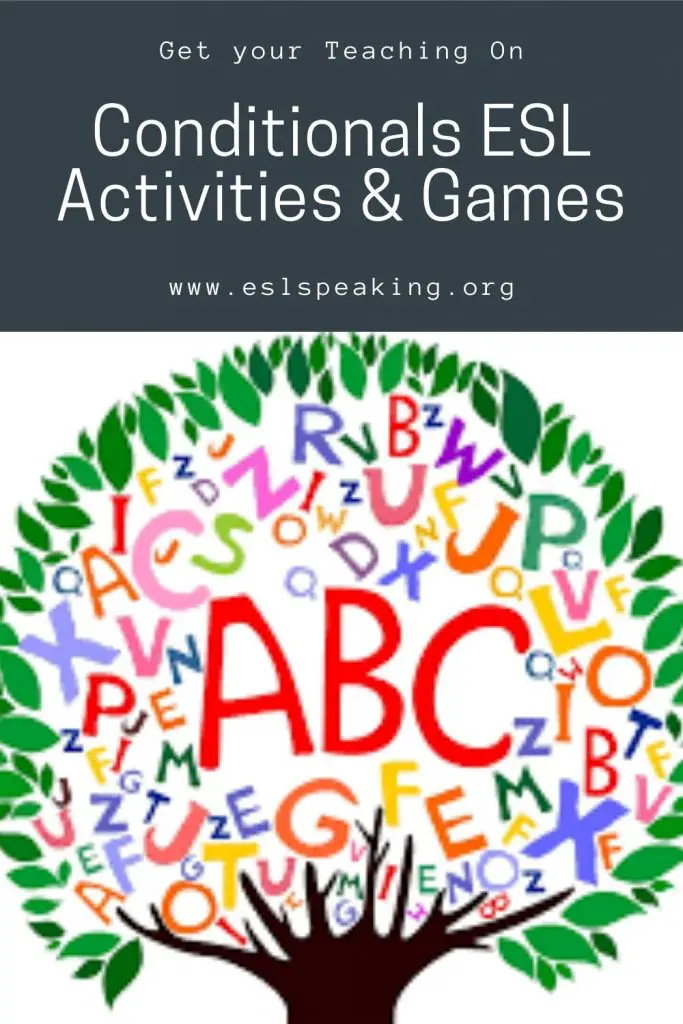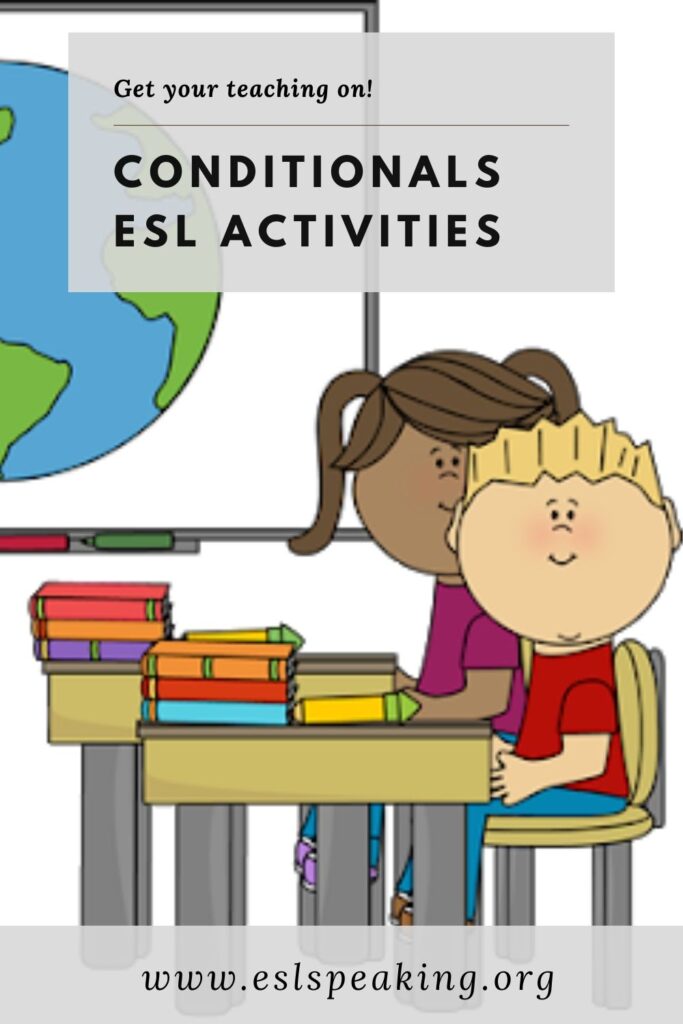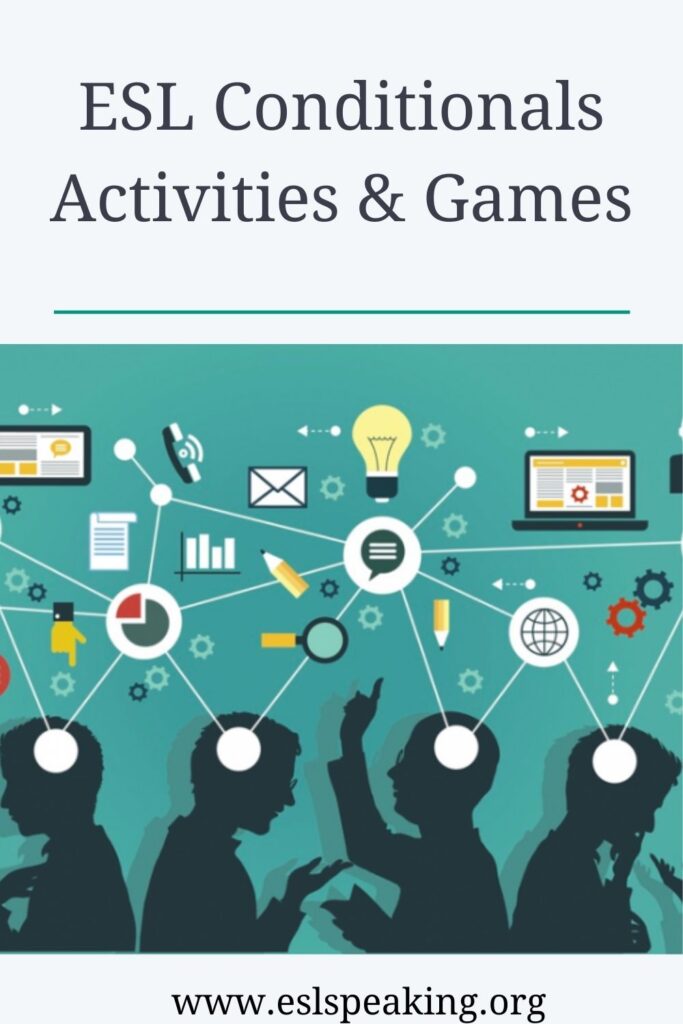If you’re looking for some of the best ESL conditionals activities, then you’re certainly in the right place. We have the best ones to try out, along with worksheets, discussion questions and lesson plans for teaching about the zero, 1st, 2nd, or 3rd conditional. Keep on reading for everything you need to know.

Conditional games and activities
Conditionals ESL Activities and Games
Let’s get into the best game and activity ideas for teaching ESL conditionals. We’ve got first conditional games, second conditional activities, third conditional speaking activities and a whole lot more.
#1: Conditional Board Games
A fun way to review this grammatical concept is to use a board game. They’re very easy to make in just a few minutes once you have a bit of practice doing it.
Fill the board with questions using “if.” Then, in order to answer them, students have to use a grammatically correct conditional statement. For more advanced learners, I like to mix things up a bit and put some statements on the board. Then, students have to formulate the correct question. Try it out:
#2: Vocabulary Auction
This is a fun activity that works very well with conditionals. Students have to bid on words using a certain budget, and then engage in a trading round. The goal is to make as many conditional statements or questions as possible.
Vocab auction does certainly require some serious preparation, but it’s totally worth it if you’re going to be doing the same activity with multiple classes. Have a look here:
#3: Hot Potato Game
This is a fun game that can create a bit of excitement in the TEFL classroom! The way it works is that students have to pass around an object of some kind and when the timer goes off or the music stops, they have to do a certain task.
For beginners, I like to ask them a question using a conditional. For more advanced students, I like to have them ask a question using a conditional to the person who passed them the object. Try out one of my favourite conditional speaking games:
#4: Relay Race Game
#5: Dictogloss
This is a nice activity for more advanced learners that focuses on listening skills. Find (or write) a passage that contains someone talking about future possibilities using conditionals (If I were rich, I would…).
Then, put students into pairs and read out the passage at a faster than normal rate. Students have to take notes and then compare with their partners to try to recreate what they just heard. Read it out again and students do the same. Finally, they can compare what they have with the original version.
It’s possible to extend this activity to have students by having students find the conditionals in it. Learn more here:
ESL Dictogloss Listening Activity.
#6: Just One Question
Try out this survey style activity went teaching conditionals to ESL students. I like it because it gets students up and out of their seats, moving around the classroom and having some fun interacting with their classmates.
Each pair has to choose a different question that uses a conditional. Then, they have to ask at least 10 of their classmates, tabulate the results and report back to the class. Check it out here:
Just One Question ESL Survey Activity.
#7: Just a Minute
Try out this speaking challenge activity conditions. The challenge is for students to speak for an entire minute without stopping. In this case, use some questions about future possibilities or hypothetical situations. For example:
- What would you do if you won the lottery?
- What would you do if you were meeting your friend for dinner and they texted to say they’d be 45 minutes late?
- How would you respond if you found out that your classmate had cheated on a big test and won a bit scholarship because of it?
- Etc.
Find out how to do it here:
Just a Minute ESL Speaking Activity.
Another option for this one is to write out a bunch of questions on cards, laminate them and then hand them out randomly. This way, it’s super easy to recycle them for years and from class to class.
#8: Running Dictation
This is a challenging 4-skills ESL activity that’s ideal for reviewing just about anything. Find (or write) a dialogue between two people talking about future possibilities. For example, what they would do if they won the lottery.
Then, students have to work together to dictate the passage and once done, they have to put it into the correct order. Check out one of the best conditional speaking activities:
#9: Dialogue Substitution
Have you ever noticed that most students just kind of blow through reading/conversation passages in books without really paying attention to what they’re reading? Of course, it’s not their fault! It’s that we haven’t given them a reason to read.
A nice alternative is to remove some of the key words which can turn this exercise from a simple reading one into one that focuses on meaning as well. Find out more:
ESL Dialogue Substitution Activity.
#10: Telephone ESL Activity
This is a fun speaking and listening activity that kids can try out. Students have to pass a message from person to person down a line and then the last person compares what they have with the original statement. In this case, use sentences with conditionals. Learn about it here:
#11: ESL Speaking Lesson with Conditionals
It’s certainly possible to plan an entire speaking lesson around one of the conditional forms (0, 1st, 2nd, 3rd). If you’ve never planned a lesson from scratch, not to worry! It’s actually easier than you might think. Here are the steps to follow:
ESL Speaking Lesson Planning Template.
#12: Conditionals ESL Conversation Starters
If you tell students to have a conversation using this grammar point, it’s obviously not going to go well and you’ll likely be met with total silence! It’s not the students’ fault, it’s that they haven’t been given enough direction.
A much better way is to give students some conversation starters. Here are some tips for doing that:
#13: Sentence Building Activities
Time spent working on building better sentences will never be wasted class time! I like to focus on forms when teaching conditionals because it certainly can be a little bit tricky. Here are some of my top activities for doing that:
ESL Sentence Building Activities and Games.
#14: Disappearing Text
If you want to focus on forms, try out this simple activity. Write a conditional statement or question on the whiteboard and have students say it out loud together. Then, erase some words and students do the same. Finally, they’ll be saying the entire thing even though there’s nothing on the board. Learn more about it:
ESL Disappearing Text Activity.
#15: First Conditional Speaking Activity, Superstitions
A nice speaking activity for the first conditional is to have students do some research about superstitions in various countries and then do a short presentation to the class. Superstitions lend themselves really well to the 1st conditional!
#16: Third Conditional Speaking Activity, Regrets
Talking about regrets is a nice way to get some practice with using the third conditional. It’s possible to do it with some real-life regrets. Or, show some pictures of people who are suffering to some degree (really full, injured leg, etc.) and then get students to make some sentences using the third conditional.
#17: ESL Reading Lesson
A nice way to teach English conditionals is with a reading lesson plan. Check out this short video for all the details you need to know to plan this type of lesson:
#18: Drilling Activities
The various conditionals and their forms can be a little bit tricky for students to remember. That’s why I like to drill them. It’s a nice way for them to become a bit more automatic for our students. Have a look here at some of the best ways to do that:
#19: Matching Sentences
Prepare sentence cards with both halves of zero conditional sentences mixed up. Students must match the correct halves.
#20: True or False Statements
Give students a set of statements, some true and some false. They have to identify the ones that follow the zero conditional pattern.
#21: Consequence Chain
Begin a story with an if-clause. Each student takes turns adding to the story using first conditional sentences.
#22: Discussion Cards
Prepare cards with various scenarios, each containing a mixed conditional sentence. Students discuss the scenarios in pairs or small groups.
Conditionals ESL Lesson Plans
A huge time-saver when teaching English is lesson plans that can just be printed off and taken to class. Here are some of the best options to consider:

ESL conditionals activities and games
ESL Conditionals Worksheets
There are a number of excellent ESL conditional worksheets to consider using for additional practice for your students. Here are some of the top recommendations:
Online Practice for Conditionals
If you want your students to have some additional opportunities to practice this important grammar concept, here are a few of the best sites to recommend for online practice:
Did you like these Games and Activities?
- Amazon Kindle Edition
- Bolen, Jackie (Author)
- English (Publication Language)
- 112 Pages - 10/24/2019 (Publication Date)
Yes? Thought so. Then you’re going to love this book over on Amazon: 39 No-Prep/Low-Prep ESL Grammar Activities and Games. The key to better TEFL classes for kids, teenagers or adults is a wide variety of interactive, engaging and fun ESL activities. This book will help you get there in style.
You can find it both digital and print formats. Pick up a copy to keep on the bookshelf in your office to use as a handy reference guide when planning lessons. Or, take the ebook with you on any device for some lesson planning on the go.
Whatever the case, get ready for some ESL teaching awesome in your life. Head over to Amazon to pick up your copy today:
Teaching Conditionals FAQs
There are a number of common questions that people have about ESL conditionals. Here are the answers to some of the most popular ones.
What are the 4 types of conditionals?
There are four types of conditionals:
- Zero conditional (if + present simple…present simple)
- 1st (if + present simple…will + infinitive)
- 2nd (if + past simple…would + infinitive)
- 3rd (if + past perfect…would + have + past participle)
How do I teach conditionals to ESL?
It’s possible to teach conditionals to ESL students by first introducing it in a context. Then, focus on forms and pronunciation, and offer an opportunity for controlled practice. Finally, finish with some freer practice and some written or spoken homework.
Why do you we use conditionals?
We use conditionals to speculate about what might happen/what might have happened and also what we wish would happen in the future. Most of these types of sentences contain the word “if” and also use a past tense verb in them.
How do you teach conditionals in a fun way?
It’s possible to teach conditionals to English learners in a fun way by using a variety of ESL games and activities. Some of the best ones to consider are
- Board games with prompts
- Songs
- Chants
- Conversation activities
- Running dictation
- Concentration
- Role-plays
- Etc.

ESL conditional activities
Have your Say about Teaching Conditionals
Do you have any tips or tricks for teaching these important grammatical concepts to English learners? Please leave a comment below and let us know what you think. We’d l0ve to hear from you.
Also, be sure to give this article a share on Facebook, Pinterest, or Twitter. It’ll help other busy English teachers, like yourself, find this useful resource.
Last update on 2025-06-17 / Affiliate links / Images from Amazon Product Advertising API






Leave a Reply